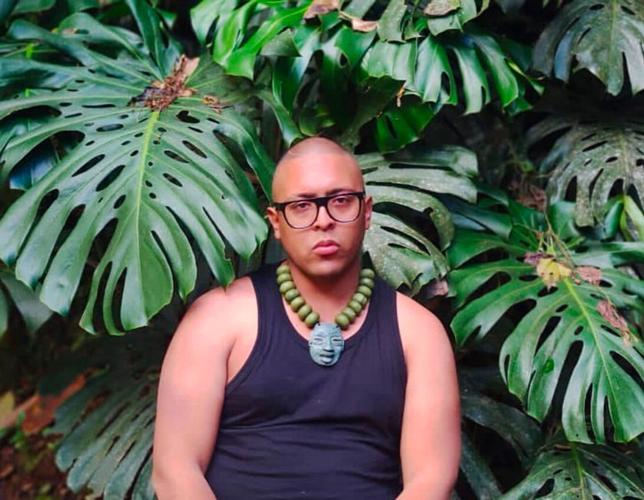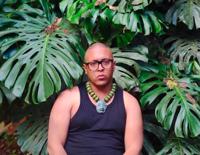
On a hot summer afternoon, artist Azomali sits in the bedroom of his small San Gabriel Valley apartment. Enjoying only the company of his two parrots, Sandia and Teyuna, the occasional chirps and soft coos of the tiny love birds can be heard along with the hum of a fan in the background as he meticulously puts the finishing touches on the lyrics of a yet-to-be-released song.
By day, the New York native works as a courier in the busy streets of Los Angeles. But by night, he works as a different kind of messenger. Instead of delivering packages, the thirty-one-year-old emcee delivers rhymes of empowerment, knowledge of self, and revolution. Performing under the pseudonym Azomali, which translates to "peace" or "tranquility" in the Nahuatl language. Originally hailing from Freeport, New York, Azomali has made a name for himself over the past fourteen years in the underground Hip-Hop scenes of New York City and Southern California. Having amassed a dedicated and growing following online, Azomali has quickly become one of the prominent torchbearers at the forefront of Indigenous resistance in underground Hip-Hop far beyond the borders of his home base in New York.
New York state of mind
Azomali’s life started in Freeport, New York, located just outside of New York City. The son of Colombian immigrants, Azomali always found himself as a link between two worlds. Effortlessly switching back and forth between English and Spanish, the New York rhyme spitter honed his skills, regularly combining both the influences of his Colombian roots with the gritty sounds of New York's underground Hip–Hop scene. Azomali first began rhyming in 2007 at the age of 13, drawing inspiration from New York mainstays such as Mobb Deep, Nas, AZ, Wu-Tang Clan, and Jedi Mind Tricks.
From an early age, he recognized that he was different from his peers and even fellow New Yorkers. “I used to always feel like I was slower-paced than the people around me,” Azomali recalled. “I learned how to appreciate the little things, the way that New York kind of teaches you how to be quiet, because you're observing. My father would come around on certain days of the week because my parents had been divorced. And we would go feed ducks at this pond, and he would teach me to connect from a young age and to be a lot more gentle with myself. Moments like that, as a kid, served as a motivation for me to find a portal of self-happiness that I still try to tap into.”
Over time, Azomali began crafting a tapestry of sounds that set his music apart from that being created by his peers. Melding influences from both traditional Colombian music and the Boom Bap Hip-Hop production heard in the music of his city, he combined the musical traditions of his own family and the experiences of his day-to-day life.
JFK to LAX
After years of rapping and dropping sporadic singles, Azomali eventually released his debut album, “Where the Mangos Grow,’ in 2018. The 12-track album quickly raised the young emcees' profile, particularly for its fiery single “F*ck Trump,’” An anti-Trump anthem that went semi-viral and quickly earned him a reputation for being a vocal critic of not the U.S. government, but of U.S. imperialism and white supremacy on a global scale.
The single also caught the ear of Big Jag, an organizer who helps orchestrate one of several Mexica New Year events in L.A. Azomali was invited to perform at the event and was immediately enthralled by the region’s underground Hip-Hop scene, Particularly by the number of artists who incorporated messages of Indigenous empowerment, decolonization and pan-Indigenous unity in their music.
“Moving out here was a major step in my growth as an artist, coming out here seeing that there are people who believe in the same things that I believe in,” he recalled. “In New York, there are people in pockets that believe in that. But in New York, I always felt like people would hear an Indigenous reference, and they'd be like, ‘that's dope’ or ‘that’s cool’, but they wouldn't feel it the way that a lot of people out here do.”
Captivated by the diversity of Southern California’s underground Hip-Hop scene, Azomali eventually moved out to California in 2019 in the hopes of connecting with more like-minded artists. Shortly thereafter, it wasn’t long before Azomali began recording music with Jag Arreola and Native Threat of Kozmik Force, a politically conscious Hip-Hop duo from Fontana. The three initially met during Azomali’s first visit out to California when the duo offer him a ride home after being stranded in the outer reaches of the Inland Empire following a late-night performance.
“The biggest adjustment moving out to Cali was the absence of a 24-hour metro system”, Azomali said. “I'm so used to being able to just hop on the train at any time. There were several times when I ended up getting stranded somewhere because I thought there was going to be a train running at two in the morning. But Jag and Threat, those people are remarkable human beings, and they inspire me every day with what they do.” Since then, the trio has recorded numerous songs together, the most notable being “Another Day”, which remains one of Kozmik Force’s most popular songs.
Revolution of the global South

Azomali, however, has not relied on his peers to incorporate revolutionary messaging into his lyrics or produce music that challenges the status quo. Over the years, the outspoken emcee has built a reputation for his intricate storytelling and effortless ability to incorporate messages of decolonization, pan-Indigenous empowerment and searing critiques of U.S.imperialism into his music. Additionally, like many of his other musical contemporaries, Azomali has not shied away from speaking out against injustices taking place overseas, beyond the borders of the United States, into the far reaches of the global south, particularly, the ongoing genocide in Gaza, which he says is the latest iteration in a long legacy of colonial forces attempting to exterminate the native people of occupied lands.
“What's happening in Gaza right now and what’s being done to the Palestinian people is horrible, and it's the same kind of genocide that took place in the Philippines. It’s the same kind of genocide that took place in Colombia, in Mexico, across Latin America, South Africa, and here in the United States”, Azomali explained. “Anywhere around the world where colonizers have set foot, they've inflicted this kind of horrific pain on their quest to eliminate the original people of the land.”
Moving forward, Azomali has no plans of slowing down or tempering his message in the era of a second Trump administration. Earlier this year, he released a joint project with Colombian artist Kasumi titled “Kasumali,” a five-track EP that he hopes will serve as a source of inspiration in today’s tumultuous times.
“I hope that people can get out of this album, that if you're not careful, you can open portals to places that you don't want to be. In the same way, you can open portals to where you do want to be”, Azomali said. “I designed the artwork for the album, and you can see there's a brick wall, which is representative of the neighborhoods in Colombia, in the mountains. The places that struggle, places that go through a lot because of the inequality within the country, and primarily the songs for people who are dreaming of a better tomorrow. There's a portal that opens up in the shape of a Chakana, aka the Andean cross. And that shows what can be achieved on the other side, if you put your mind to it.”
Resistance in the age of Trump
For Azomali, the act of creating art is not just a creative exercise in times of despair, but an open act of defiance against a system that still actively tries to suppress and marginalize communities of color. Not just in the U.S., but in every corner of the globe. “I almost feel like Trump and oppressors in general want us to feel like we shouldn't express our music or our art as another way to suppress our creativity”, he lamented. “They want us to feel like we can't produce any kind of resistance. They want us to be silent, and it adds to the mental hold that they want to have on us.”
As the Summer begins to wind down in what has already been a very long several months for Los Angeles, Azomali reflected on the people and places that keep him motivated during these trying times. Particularly following the military occupation of 2,000 National Guard troops and months of relentless ICE raids across the city.
“What keeps me going is remembering that there are people out there who don't have the resources to put their stuff out there”, Azomali said somberly. “I understand that me making music is an act of defiance against cultural erasure that was supposed to have taken place hundreds of years ago. Whenever I step into the booth, I try to make sure that I represent myself and all of my ancestors. And I try to make sure that my family is never forgotten. Because they went through a lot just for us to even exist.”













(0) comments
Welcome to the discussion.
Log In
Keep it Clean. Please avoid obscene, vulgar, lewd, racist or sexually-oriented language.
PLEASE TURN OFF YOUR CAPS LOCK.
Don't Threaten. Threats of harming another person will not be tolerated.
Be Truthful. Don't knowingly lie about anyone or anything.
Be Nice. No racism, sexism or any sort of -ism that is degrading to another person.
Be Proactive. Use the 'Report' link on each comment to let us know of abusive posts.
Share with Us. We'd love to hear eyewitness accounts, the history behind an article.